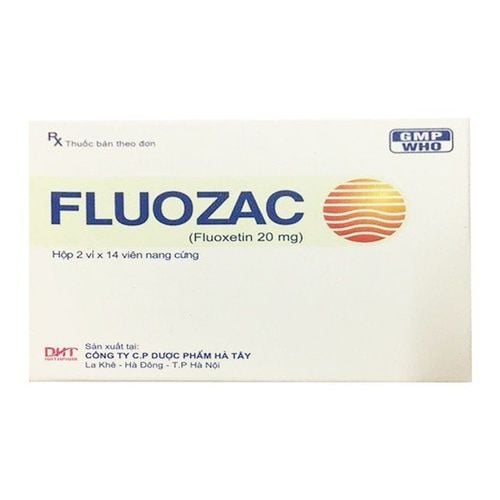This is an automatically translated article.
Magrilan medicine 20mg containing the active ingredient Fluoxetin 20mg is indicated in the treatment of depression, bulimia, obsessive-compulsive disorder, panic syndrome... Let's learn about its uses and notes When using the drug Magrilan 20 through the article below.
1. Uses of Magrilan 20mg
Magrilan medicine 20mg is made in the form of hard capsules containing the active ingredient Fluoxetin 20mg. Fluoxetine is a bicyclic antidepressant that selectively inhibits neuronal serotonin reuptake. The duration of action of Fluoxetin is relatively slow, so cases of major depression may not be relieved immediately with fluoxetin treatment. Fluoxetin's action is specific to serotonin-secreting neurons, so the risk of side effects commonly seen with older tricyclic antidepressants does not occur with fluoxetin.
Magrlan 20 is indicated in the following cases:
Treatment of depression; Treatment of obsessive-compulsive disorder; Treatment of bulimia; Panic syndrome.
2. Dosage of the drug Magrilan 20
Magrilan 20 is taken orally, the dose of the drug is prescribed by the treating doctor and the patient's condition. Some recommendations on the dosage of Magrilan are as follows:
Treatment of depression: The recommended starting dose is 20mg/day taken in the morning. The dose may be reduced in some patients (5mg/day or 20mg every 2-3 days). The maintenance dose depends on the patient's response. Usually the clinical effect of the drug is achieved after 2-3 weeks of treatment, so it is not recommended to increase the dose frequently; Treatment of obsessive-compulsive disorder: The recommended starting dose is 20mg/day divided into 2 doses, morning and evening. The dose may be increased in some patients (up to 80mg/day); Treatment of bulimia: The recommended dose is 60mg/day, can be taken once in the morning or divided into 2 times morning - evening; Treatment of panic attacks: The recommended starting dose is 10 mg/day taken in the morning. The dose can be increased to 20mg/day after 1 week. In case the patient has no signs of improvement in 1-2 weeks, the dose can be increased to 60mg/day; Elderly people, patients with liver failure: The dose should be considered to reduce, reduce the rate of increase of dose. Elderly patients are advised to start at 10 mg/day and not to exceed 60 mg/day.
3. Side effects of Magrilan 20
Magrilan 20mg medicine can cause some side effects as follows:
Common: Dizziness, fatigue, sweating, inability to ejaculate, impotence, decreased sex drive, diarrhea, nausea, loss of appetite, itching, skin rash, tremors, restlessness, insomnia ; Uncommon: Headache, dyspepsia, dry mouth, bronchospasm, urticaria, urinary retention; Rare: Serum sickness, syncope, tachycardia, arrhythmia, vasculitis, dyskinesia, extrapyramidal reactions, paresthesia, Parkinson's syndrome, epilepsy, hyperprolactinemia, hypo or hyperthyroidism, lactation, gynecomastia in men, skin rash, lupus erythematosus. Patients need to stop using the drug and notify the doctor in case of any side effects while taking Magrilan 20mg.
4. Note when using the drug Magrilan 20mg
4.1. Contraindications Contraindicated to use Magrilan 20 in the following cases:
Patients with hypersensitivity to Fluoxetin or any component of the drug; Patients with severe renal impairment with creatinine clearance less than 10ml/min; Patients who are taking MAO inhibitors; Patients with epilepsy or a history of epilepsy. 4.2. Precautions for use MAO inhibitors should only be used when treatment with Magrilan has been discontinued for at least 5 weeks. Use caution and reduce the dose in patients with impaired liver function or liver disease. Magrilan can cause decreased concentration, drowsiness, reduced thinking and movement, so patients need to be careful when driving, operating machinery or doing jobs that require high concentration. Magrilan 20 can cause headaches and dizziness, so patients should be careful not to get up suddenly while in a lying or sitting position. For pregnant women: Safety when using Fluoxetin in pregnant women has not been established, so Magrilan 20 is not recommended in these subjects. For lactating women: Fluoxetin can be excreted in human milk, so Magrilan is not recommended in nursing women.
5. Drug interactions
Do not use Magrilan 20mg at the same time with MAO inhibitors such as Procarbazin, Furazolidone, Selegilin... because of the risk of confusion, high fever, agitation, high blood pressure, convulsions...
Active ingredient Fluoxetin cause a strong inhibitor of the enzyme P4502D6, so do not use Magrilan 20 simultaneously with drugs that are metabolized by this enzyme and have a narrow therapeutic range such as Encainid, Flecainide, Carbamzepine, Vinblastin and tricyclic antidepressants... In In case of mandatory use, the dose of these drugs should be adjusted to the lowest effective level.
Fluoxetin increases plasma concentrations of Maprotilin, Trazodon and tricyclic antidepressants.
Concomitant administration of Magrilan and Diazepam increases the half-life of Diazepam in some patients, however psychomotor response and physiological response may not be affected.
The risk of side effects is increased when Fluoxetin is used with psychoactive drugs.
Fluoxetin pushes drugs that are strongly bound to proteins out of the binding site, increasing the free concentration of the drug and increasing the risk of unwanted effects, including Digitoxin, anticoagulants...
Concentration Phenytoin in plasma is increased when co-administered with Fluoxetin.
Lithium toxicity has been reported with use with Fluoxetine. Therefore, the patient should be carefully monitored in this case.
Drug interactions occur that reduce the therapeutic effect of Magrilan 20, increasing the risk of unwanted effects. Therefore, patients need to inform the treating doctor of any drugs and supplements they are using before treatment with Magrilan 20mg.
Please dial HOTLINE for more information or register for an appointment HERE. Download MyVinmec app to make appointments faster and to manage your bookings easily.













